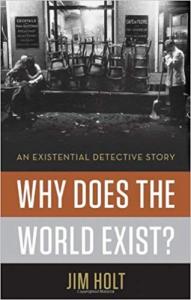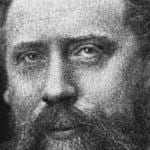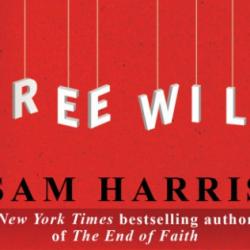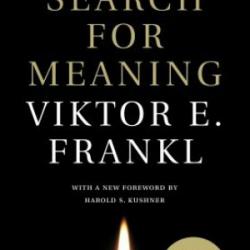 For those intoxicated by the Why is there something rather than nothing? question, I’m confident they’ll find Jim Holt’s book Why Does the World Exist?: An Existential Detective Story an outstanding read. Part biographical, part “existential detection story” (book subtitle); it soars on both fronts. In style, it reads very much like Lee Strobel’s Case for Faith, though Holt’s would be more a Case for Agnosticism, but in a good way. Though I differ in his conclusion, the depth of the journey, both personal and philosophical, is to be admired.
For those intoxicated by the Why is there something rather than nothing? question, I’m confident they’ll find Jim Holt’s book Why Does the World Exist?: An Existential Detective Story an outstanding read. Part biographical, part “existential detection story” (book subtitle); it soars on both fronts. In style, it reads very much like Lee Strobel’s Case for Faith, though Holt’s would be more a Case for Agnosticism, but in a good way. Though I differ in his conclusion, the depth of the journey, both personal and philosophical, is to be admired.
Holt’s initial curiosity in high school in philosophy and existentialism led him to pick up a copy of Heidegger’s Introduction to Metaphysics where he became intoxicated by the very question of existence, in Holt’s words, “so profound that it would occur only to a metaphysician, yet so simple that it would occur only to a child” (page 9). He suggests his Catholic upbringing stifled the question, in God being the cause of existence, but God Himself being self-caused and ground of all being. Jut as unsatisfactory, he maintains, are the typical responses of nonbelievers, specifically those that resort to scientific explanations.
A scientific explanation must involve some sort of physical cause. But any physical cause is by definition part of the universe to be explained. Thus any purely scientific explanation of the existence is doomed to be circular. Even if it starts from something very minimal – a cosmic egg, a tiny bit of quantum vacuum, a singularity – it starts with something, not nothing (page 10).
This point was made in philosopher of science David Albert’s review of Lawrence Kruass’ book A Universe from Nothing. Smuggling in a quantum vacuum and calling it “nothing” is slight of hand and simply bad philosophy. For the intellectually honest skeptic, this is not on offer. Holt maintains the “brute fact”, “just is” universe is on the table, though not intellectually dishonest, it seems to be “throwing in the towel.” The Principle of Sufficient Reason beckons, says Holt, and “there must be an explanation for the existence of the world, whether we can find it or not” (page 11). Hence we arrive at the ultimate dilemma:
“Are we then doomed to choose between God and the deep brute Absurd?” (page 12)
This question highly resonated with me in my own intellectual development. It still does. Whether one a believer or skeptic, there are some bad metaphysicians out there of both stripes that just want to shut down the conversation. Brute fact religion or irreligion just doesn’t cut the mustard for those inebriated by metaphysical wonder. And so it went for Holt. In reading Hume’s Dialogues Concerning Natural Religion in his first philosophy course, Holt was inspired by the trio of characters debating the existence of God. Philo, the skeptical character, granted that it seems that a deity is needed to be the cause of existence, but this may be due to our cognitive limitations. Perhaps, then, there is another option:
“Perhaps the choice was not God versus Brute Fact after all. Perhaps there was a nontheistic explanation for the world’s existence – one discoverable by human reason. Although such an explanation wouldn’t need to posit a deity, it wouldn’t necessarily rule one out either. Indeed, it might even imply the existence of some kind of supernatural intelligence, and in doing so furnish an answer to the precocious child’s dread question: “But mommy, who made God?” (page 14)
The stage is set. Now Holt would go onto play detective on the question of being with philosophers, theologians, particle physicists, cosmologists, mystics, and a novelist.
First up was Andrei Linde, founder of the “chaotic inflation” theory, which requires very little matter (1/100,000 gram). In Linde’s words, “all the matter in the universe gets created from the negative energy of the gravitational field” (page 18). This opens up the possibility of the universe being created by natural beings. If the universe we live in is so easy to come by, and filled with imperfections (disease, evil, disasters, etc.), perhaps the “physicist hacker” is just as (if not more) viable. Holt gives this credence as a possible explanation, but is sharp to point out that “orthodox believers can always respond to a scenario like Linde’s saying, ‘Okay, but who created the physicist hacker?’ (page 19). Nonbelievers too, anyone philosophically or metaphysically inclined, still denote an outside cause is required.
Holt dives into this idea of nothing and how the ancient Greeks and prior premodern cultures always assumed something preexisting (water for Thales, fire for Heraclitus, etc.) Whatever the foundation, it was eternal. But the prevailing monotheistic thinkers (Jewish, Muslim, and Christian) hitched onto the idea of creation ex nihilio, hence the idea of nothingness was on offer. Perhaps no better champions in Aquinas and Leibniz, the latter actually posing the famous question. For these thinkers, the idea of nothing was not only on offer, but there must be a Necessary Cause required and sufficient reason why anything exists at all (note Aristotle held a similar cosmological argument, even though he held the Universe to be eternal, it would still require a First Cause). Kant and Hume would attack the idea of metaphysical necessity, but, as Holt maintains (and quite correctly in my view) that neither “took the question of Why is there something rather than nothing? seriously” (page 24). For Hume, any answer lies outside our experience; for Kant a violation of our perceptual limits (we only have access to our cognitive representations of things, not the “thing in itself”).
For Heidegger, this was the “deepest” and “most fundamental of all questions, Wittgenstein also “deeply respected” the question, though he believed it went beyond the limits of language and ultimately the aim of philosophy, though as Holt pointed out, criticized A.J. Ayer’s reasoning as “incredibly shallow”. Ayer, in a famous debate with Fredrick Copleston in 1949, asserted that the question was meaningless as it asks “what event is prior to all events” and “no event can be prior to all events because it’s a member of the class of all events it must be included in it, and therefore can’t be prior to it” (page 26). The shallowness is that it reduces the question to one of temporality rather than metaphysical necessity (“What happened before the Big Bang?”); even if we exist in an infinite multiverse (and our Big Bang was just the beginning our universe) why does the multiverse exist and what is it’s cause? (would ask Aristotle and many others after him). In Aristotelian terms, we would label quantum vacuums “potentiality,” so naturally the Aristotelian question follows: where did the quantum vacuums come from? Disdain for the question doesn’t make it go away.
Holt sees thinkers divided into three camps by the question Why is there something rather than nothing? The “optimists” hold that there has to be a reason for the world’s existence, and that we may well discover it. The “pessimists” believer that there might be a reason for the world’s existence, but that we’ll never know for sure – perhaps because we see too little of reality to be aware of the reason behind it, or because any such reason must lie beyond the intellectual limits of humans, which were tooled by nature for survival, not for penetrating the inner nature of the cosmos. Finally, the “rejectionists” persist in believing that there can’t be a reason for the world’s existence, and hence the very question is meaningless (page 30).
Holt then goes through various options like monotheism (where God is the Cause of the Universe) or an impersonal Spinoza-type God where God and the Universe are one – hence the universe is the cause of itself. Or, perhaps is it entirely naturalistic and just happened by chance. But Holt is quick to scratch his head here philosophically and scientifically and reminds us that nothing “in addition to be the simplest, the least arbitrary, and the most symmetrical of all possible realities, also has the nicest entropy profile. Its maximum entropy equals its minimum entropy equals zero” (page 60). Should this slide us more towards optimist, pessimist, or rejectionist in thinking about the reason for existence?
He then goes on tour to interview some great thinkers on this question, first up a rejectionist and prolific philosopher of science Adolf Grunbaum. Grunbaum, an atheist, casts doubt on the idea of nothing being the burden of proof (as opposed to something). Whether or not it maybe the simplest idea, it need not be true. He also challenges the very idea of “something from nothing” and that the question is non-sensical because, as Grunbaum reminds us, ‘there is no before” the Big Bang. If there was no spacetime before the Big Bang, the question what happened before is meaningless. And for the atheist philosophers that think this is a copout and still find the question of being a profound question? Grunbaum believes people like these been influenced by religious upbringing (whether or not they reject it) – in his words “they absorb it with their mother’s milk” (page 69). But Holt remains unconvinced as Grunbaum’s lack of awe. Even a “Theory of Everything” or unified theory of gravity, electromagnetism, strong nuclear force, and weak nuclear force would still pose the question:
“Indeed, such a unified theory might turn out to be the closest we can come to giving a complete physical explanation of why the world is the way it is. But the final theory of physics would still leave a residue of mystery – why this force, why this law? It would not contain within itself an answer to the question of why it was the final theory. So it would not live up to the principle that every fact must have an explanation – the Principle of Sufficient Reason. On the face of it, the only theory that does obey this principle is the Theory of Nothingness. That is why it’s surprising that the Theory of Nothingness turns out to be false, that there is a world of Something. And any theory of this world of Something, however simple and ultimate, is doomed to fail the test of Sufficient Reason” (page 74)
Holt wouldn’t be content with surmising that the question is meaningless. His next interview would be at the opposite side of the spectrum (an “optimist” on the question), theologian and philosopher Richard Swinburne who argues that God is a simplest hypotheses as to why there is something rather than nothing. Swinburne, with classical theists agree that God is ontologically ultimate, but against classical theists that God is logically necessary. Holt correctly presses how the “God of the Philosophers” is related to a personal Christian God for which Swinburne argues monotheistic traditions have considerable transcendental thinking as a central part of their conception of who God is. Christianity, for example, certainly goes further than the God of the Philosophers, but the Biblical conception and the philosophical are, per Swinburne, far from contradictory.
Holt seems equally dissatisfied with Swinburne as he does with a Brute Fact materialism (the universe is its own cause) or a rejectionist “the question is meaningless”. Swinburne’s theism seems to deal with the question of existence by positing a God as “the Supreme Brute Fact”. Swinburne’s God is just the simplest explanation, though he has no explanation as to why God exists (again, this is in stark contrast with classical theism which posits God as the Necessary Being of which all contingent things depend, which Holt is careful to point out).
On to physicist David Deutsch and the Multiverse; contra Swinburne’s God, the multiverse was the simplest hypothesis. At the same time, Deutsch doesn’t believe there can be an ultimate explanation for existence. Even quantum mechanics, Deutsch is quickly to point out (sorry again Lawrence Krauss) that “when you talk about a particle and an antiparticle appearing in the vacuum, that’s not at all like coming into existence out of nothing. The quantum vacuum is a highly structured thing that obeys deep and complex laws of physics” (page 118). The Multiverse may explain the Big Bang, but you can always ask “Why does the Multiverse exist?”
Then to iconic physicist Steven Weinberg who thinks the ultimate question is part of the larger question “Why are things the way they are”? Perhaps the unified theory (quantum theory of gravity unifying general relativity and quantum mechanics) may dictate there has to be something instead of nothing, but in Weinberg’s view, “that wouldn’t take away the wonder. You’d still have to ask, ‘Why are these laws that way, rather than some other way?’ (page 140). And he doesn’t feel God or religion helps as you’re faced with the same question (why did God do it that way)? Same with the Multiverse. Even if we proved a Multiverse, we’d answer the anthropic principle in terms of why life is permissible in our Universe, but Weinberg would still feel “the mystery of why the laws of nature are such as to produce the multiverse of which our universe is a part” (page 142). And whether its String Theory or Many Universes, these are great metaphysical models (Weinberg analogized these to Anselm’s ontological proof of God) – and that you are not warranted from moving from thinking/modeling something existing to it actually existing. After all, these other universes these are inaccessible to us.
I shared a lightbulb moment with Holt in his realization that even with a final theory and inflationary multiverse “bound to quantum tunnel out of nothingness”, we don’t know why there is something rather than nothing. “It would only show that the laws describing the regularities inside the world are incompatible with the nonexistence of that world ” (page 147).
Perhaps the Platonic route offers hope? Given the eternal nature of mathematics, and with that, what Eugene Wigner labeled the “unreasonable effectiveness of mathematics”, perhaps the foundation of existence is mathematical? Max Tegmark is also highlighted in taking this view, but even a more extreme Many Universe form. But if we reject the ontology of mathematical objects or have alternate explanations as to the effectiveness of mathematics (we do), mathematics as the ultimate explanation seems incredibly far out.
Panpsychist and other innovative theories like philosopher Derek Parfit’s are put forward. For Parfit, though non-existence maybe the simplest idea, it may not have been simplicity (no “selector”), but randomness that won the day. In other words, non-existence would be a special case selecting for simplicity where existence may have just been a lucky free lunch.
Whether or not the reader is satisfied with any of these theories, the author does a very nice job taking us through a tour of philosophy on the ultimate question of existence and how some modern thinkers have tackled the question in light of contemporary science and philosophy. He also does a very nice job not answering the question.
His mix of his own personal stories weaved into his interviews (and his reactions to those interviews) nicely mixes up some very abstract philosophical banter – which makes you feel like you’re very much part of his own personal journey and thought process. At the end of the book, he signals his dissatisfaction for the typical God or chance/quantum fluctuations responses and shows us a potential third outside the box Buddhist approach: if existence itself is an illusion – not nothingness, but neither the something we traditionally conceive it as – perhaps the why is there something rather than nothing question is a a lot less mysterious. Is existence an,
“insubstantial dream, an empty illusion? Is it gross and viscous and absurd, as Sartre held, or is it a divine gift… Or could the whole thing just be an inexplicable quantum fluke?” (page 250)
Perhaps that Buddhist framework offers promise. Then again, perhaps, like so many of us, he’s unsatisfied with any final theory. Perhaps a final theory can’t be found; or, if it is, it would remove the wonder.
Notes:
[1] Page numbers cited are from 2012 edition.












